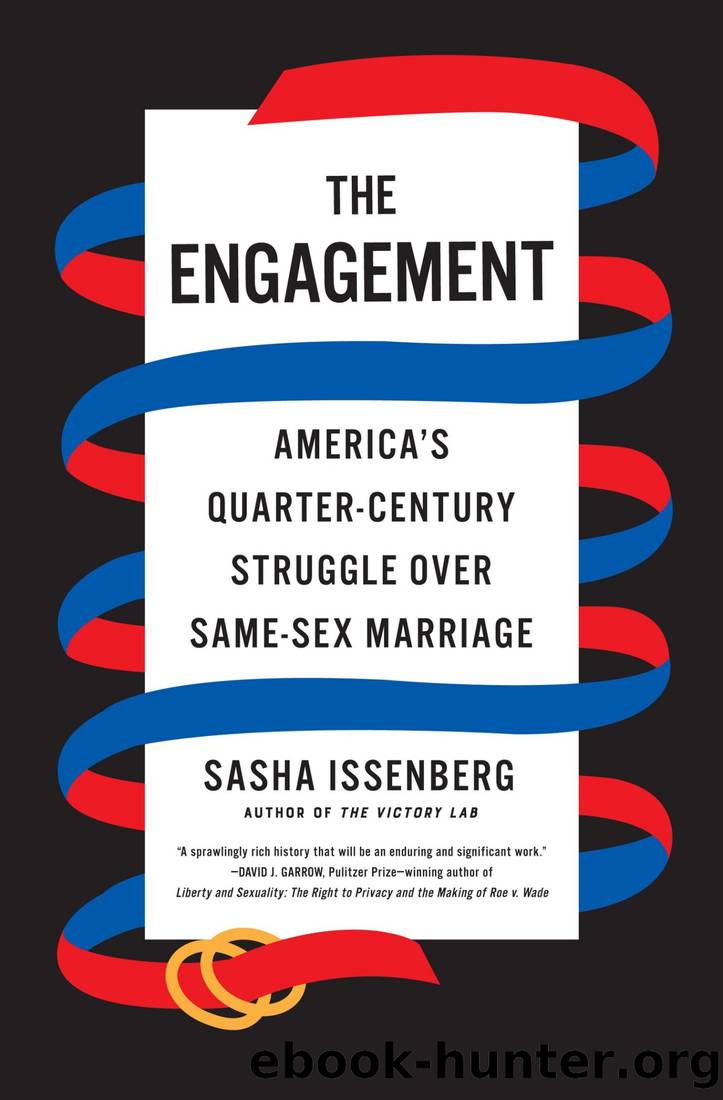The Engagement: America's Quarter-Century Struggle Over Same-Sex Marriage by Sasha Issenberg

Author:Sasha Issenberg [Issenberg, Sasha]
Language: eng
Format: epub
ISBN: 9781524748746
Google: qxGuDwAAQBAJ
Amazon: B07XKPK8XY
Publisher: Knopf Doubleday Publishing Group
Published: 2021-06-01T04:00:00+00:00
59
Let California Ring
The ambitious 10-10-10-20 strategy demanded a motley set of tasks: both political and legal work, offense and defense, aiming for equal rights for gay couples without foreclosing incremental gains that fell short of marriage, beginning in the states but eventually requiring the federal government to play a role, too.
None of the established gay-rights organizations that sent emissaries to Jersey City were built for that work. The largest of them, the Human Rights Campaign, had just backed off its commitment to marriage in the wake of dispiriting losses in 2004, and it seemed unlikely that any group not uniquely devoted to marriage would make a sustained priority of a cause that likely had more heartbreak in its future.
When the ACLUâs Matt Coles circulated a draft communiqué that proposed creating a new central organ to centralize implementation of the strategy, the idea was met with dissension. Such a proposal was rejected by state-level organizations, which already had a contentious relationship with the Human Rights Campaign over its sporadic efforts to participate in politics beyond Washington. It was also rebuffed by the Human Rights Campaign itself, which was unwilling to help charter a rival for talent, donations, and influence over how the gay-rights movement practiced politics. âSome thought existing organizations would be unwilling to work with an independent campaign organization, some thought our community would be deeply resistant to anything that highly organized,â Coles summarized in a July 2005 email to Jersey City attendees. In it, he explained why the final concept paper reflected a preference for âa staffed, structured, enhanced collaboration between existing state and national groups, gay and non-gay, working on marriage.â
That new structure, called the National Collaborative, was chartered in 2007 for a three-year trial period. Upon its creation, the National Collaborative identified seven discrete state-level objectives, prioritizing those where there was a âhigh potential to advance marriage goalsâ over the next three years. Participants would be expected to review grant proposals from local organizations and supply staff to coach recipients. The circle of emergent donors cultivated by Tim Gill would drive money to support their work.
California was among those states designated for special attention by the National Collaborative. At the Jersey City summit, it had been among the first to be inscribed on the list of ten states expected to deliver full marriage rights by 2025. But the âWinning Marriageâ plan went further in its aims for the countryâs largest state, identifying it as a short-term priority for the movement, one where gay-marriage advocates stood to notch an imminent win without any help from the courts. âCalifornia is a state where marriage through the legislature, or even at the ballot, is a real prospect,â the plan declared.
To date, gay-rights strategists in California had stuck to an incrementalist track. The legislature had first established a domestic-partnership registry in 1999, and each year added new benefits until it was so comprehensive that Freedom to Marryâs Evan Wolfson described it as âall but marriage.â By early 2004, a California
Download
This site does not store any files on its server. We only index and link to content provided by other sites. Please contact the content providers to delete copyright contents if any and email us, we'll remove relevant links or contents immediately.
| Africa | Americas |
| Arctic & Antarctica | Asia |
| Australia & Oceania | Europe |
| Middle East | Russia |
| United States | World |
| Ancient Civilizations | Military |
| Historical Study & Educational Resources |
The Dawn of Everything by David Graeber & David Wengrow(1707)
The Bomber Mafia by Malcolm Gladwell(1622)
Facing the Mountain by Daniel James Brown(1553)
Submerged Prehistory by Benjamin Jonathan; & Clive Bonsall & Catriona Pickard & Anders Fischer(1455)
Wandering in Strange Lands by Morgan Jerkins(1429)
Tip Top by Bill James(1416)
Driving While Brown: Sheriff Joe Arpaio Versus the Latino Resistance by Terry Greene Sterling & Jude Joffe-Block(1376)
Red Roulette : An Insider's Story of Wealth, Power, Corruption, and Vengeance in Today's China (9781982156176) by Shum Desmond(1359)
Evil Geniuses: The Unmaking of America: A Recent History by Kurt Andersen(1352)
The Way of Fire and Ice: The Living Tradition of Norse Paganism by Ryan Smith(1336)
American Kompromat by Craig Unger(1315)
F*cking History by The Captain(1303)
It Was All a Lie by Stuart Stevens;(1300)
American Dreams by Unknown(1285)
Treasure Islands: Tax Havens and the Men who Stole the World by Nicholas Shaxson(1272)
Evil Geniuses by Kurt Andersen(1257)
White House Inc. by Dan Alexander(1212)
The First Conspiracy by Brad Meltzer & Josh Mensch(1174)
The Fifteen Biggest Lies about the Economy: And Everything Else the Right Doesn't Want You to Know about Taxes, Jobs, and Corporate America by Joshua Holland(1126)
